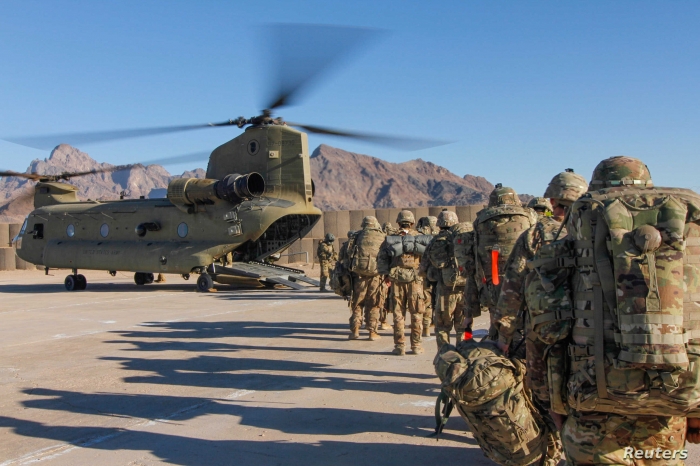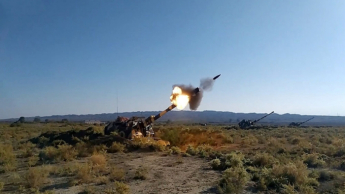Will the Americans leave Afghanistan?

|

U.S. soldiers load onto a Chinook helicopter to head out on a mission in Afghanistan, Jan. 15, 2019.
The White House announced that the Americans are completely withdrawing from Afghanistan. The withdrawal of troops was timed to coincide with the date of September 11.
The White House announced that the Americans are completely withdrawing from Afghanistan. The withdrawal of troops was timed to coincide with the date of September 11. Many analysts and experts doubt this date. At the moment, they have announced their retirement, but this is not certain. Why?
First, there is a very big disagreement on this issue in the United States. And in the Ministry of Defense, and in Congress, and in the Foreign Ministry, and the democrats criticize this decision, the republicans generally oppose it. European partners too, because the US and Western countries have spent several hundred billion dollars on the Afghan campaign over the past 20 years. According to some reports, this figure reaches a trillion dollars. And just pick up and leave - this approach does not entirely meet the interests of the United States.
It seems to me that the withdrawal of US and NATO troops from Afghanistan will be more similar to the withdrawal of American troops from Iraq. Where they allegedly left from, leaving a 10,000-strong contingent of troops to guard the embassy and other American facilities, retaining several military bases there. The other day Iraq was attacked by an Israeli base, which is present there. This happened in Iraqi Kurdistan. Some claim pro-Iranian forces. As you know, as a result, up to 10 Israeli security personnel were killed. In general, such a scenario is also possible.
It is not necessary that there be any contingents of troops there. CIA officers and a large number of representatives of the security services of various structures may be present there. These will be employees of private companies that have a sufficient number of mercenaries, but not in military uniform. More reminiscent of the police and who will be there under contract.
There is one more nuance here. Perhaps, if a new interim government is created as a result of the conference on a peaceful settlement in Afghanistan, which will be held in Turkey, the Americans can sign a new agreement with the same government. A contingent of troops can be deployed in Afghanistan under the auspices of the UN in the status of peacekeepers. After all, earlier there were AISAF forces in Afghanistan. These forces may continue to be there.
In my opinion, the withdrawal of troops will take about six months. And a lot can happen during this time. The Americans can adjust their position at any time and find a reason to stay in Afghanistan in one form or another.
The Taliban, in turn, will violate the agreement, as before. They made it clear that as long as all foreign troops do not leave the territory of Afghanistan, they will not participate in any conferences. This means that the fighting will continue. In this sense, we can say that in Afghanistan, as in a card game, different cards are played. This means that, perhaps, some of the Taliban will join the peace agreements, some - the radical Taliban - may ignore them altogether and will fight.
It is worth considering that the Taliban are not one group that is fighting in Afghanistan. There is also ISIS and many other radical groups. There is a group that is completely under the control of the Pakistani special services.
The situation is unpredictable and difficult. The reaction of India, Iran, Russia is still unknown. Relations between Russia and the United States, in connection with the situation in Ukraine and in the Black Sea basin, can be described as "dramatic". Nevertheless, there is still hope for relief. But if the escalation continues, it could negatively affect the Afghan side as well.
The Americans want to create such a triangle, which will include the Northern Alliance and pro-Western elements. Americans will also strive to keep pro-Western elements in the leadership. Thus, part of Afghanistan with some provinces will be given under the control of the Taliban, while the northern territories remain under the control of Abdul-Rashid Dostum, the Mujahideen, etc. And, of course, some territories will go to pro-Iranian shiite parties in Afghanistan. However, it is not known how this scheme will operate.
It seems to me that the future structure of power in Afghanistan will de facto be built on the principle of confederation. Part of the territory will be given to the Taliban, where sharia will be established. Will the Taliban be happy with this achievement, or will they continue to fight to spread their influence throughout Afghanistan?
This is a very important point. One way or another, the americans must correct their position before September 11th. I personally doubt that the Americans will completely withdraw from Afghanistan. This is a very expensive pleasure. If they leave Afghanistan, it means that they admit defeat. Tactically, the situation will change, but I do not think that there will be any major shifts in the US strategy. There is every reason to assert that the situation in Afghanistan will continue to deteriorate.
The author is the ex-ambassador of Afghanistan to Kazakhstan and Kyrgyzstan and Director of the Center for Afghan Studies in Germany (Frankfurt).
(If you want to contribute and have specific expertise, please contact us at [email protected])
The Rocket and Artillery formations of the Azerbaijan Army conduct live-fire exercises in accordance with the combat training plan for 2021, the Ministry of Defense of Azerbaijan told Baku Tribune.
LAST NEWS






.jpg&h=67&w=67&zc=1&q=100)













